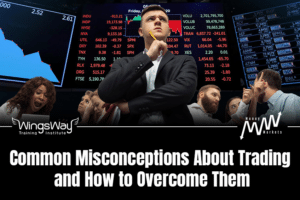
5 Reasons Why You Should Take a Stock Market Trading Course in 2024
After the whirlwind changes of the pandemic in 2020, many people found themselves either working from home, managing newly flexible hybrid schedules, or even receiving stimulus checks due to sudden unemployment.
With extra time on their hands, a taste of independence, and increased savings due to lower spending, some curious individuals began exploring new ways to make money from home. One of the most popular ways of doing that is trading and investing in the financial markets.
However, statistics show that about 80% of those who jumped into trading without solid education have either quit or suffered financial setbacks. Trading without the right knowledge, guidance, and mentorship can feel more like gambling than investing. Trading success is more than just “buy low, sell high”—it’s about everything in between.
To thrive as a trader, you need a deep understanding of market dynamics, emotional resilience, and a well-rounded strategy. That’s where professional trading education comes in.
Here’s why investing in a stock market trading course in 2024 could be one of the smartest moves you make this year.
5 Advantages of Learning How to Trade the Stock Market
-
Build a Strong Foundation
For new traders, diving into the markets without a firm foundation often leads to costly mistakes. In fact, research from the Securities and Exchange Board of India (SEBI) shows that over 95% of retail traders face losses early on, primarily due to a lack of fundamental knowledge, amongst other reasons.
Think of it like learning how to drive—without the right training, even the best car won’t keep you from crashing.
That’s where a structured trading course can make all the difference. At WingsWay, we teach foundational concepts to help you trade with confidence. You’ll cover:
- Key Concepts: Understand terms like “market order,” “limit order,” “Candlesticks”, “Price Action”, “Technical and Fundamental Analysis”, “Volume, and “short selling”—the language of trading itself. These aren’t just definitions but the building blocks that guide every trade in any market you trade and invest in.
- Diverse Markets: Stocks, commodities, forex, crypto—each market has its own personality. You’ll learn how each one operates, helping you diversify and understand where your trading style fits best. We also dive deep into the stock market where you can trade and own pieces of companies.
- Risk Management: Strategies like setting stop losses, understanding demand and supply, managing trades effectively and creating a diversified portfolio are critical for long-term survival in trading. Knowing how to manage risk gives you a safety net so you can trade smarter and consistently to survive in the markets long-term.
With a strong foundation, you’re setting yourself up to avoid beginner mistakes and start with a more strategic, well-informed approach.
-
Analyze Markets with Confidence
Picture this: instead of staring blankly at a chart, you can spot trends, patterns, and opportunities that others miss because you can understand why the price of an asset is moving the way it is. This is where trading moves from random guessing to calculated decision-making.
In the WingsWay Stock Market Trading course, you’ll learn to analyze market data with precision. Here’s what that means in practice:
- Chart Patterns: You’ll start recognizing formations like “head and shoulders” or “double tops” as early signals for strategic moves. These patterns tell stories about market sentiment, allowing you to anticipate potential price changes.
- Technical Indicators: Tools like moving averages and the Relative Strength Index (RSI) help you spot price momentum and potential reversals, sharpening your understanding of when to enter or exit trades.
- Financial Analysis: The real edge in trading often comes from understanding a company’s fundamentals. By interpreting balance sheets and earnings reports, you can make more informed choices, especially when trading stocks.
With these skills, interpreting market behavior becomes an information-based decision, not a guessing game. You’ll find yourself making decisions grounded in analysis rather than emotions.
-
Mastering Your Mindset
A sound strategy means little if your emotions get in the way. As many traders find, fear and greed can sabotage even the best-laid plans. Trading psychology is where mental resilience meets financial discipline and mastering it can separate consistent winners from emotional wrecks.
In our courses, we lay strong emphasis on trading psychology, covering:
- Managing Emotional Triggers: Fear of missing out (FOMO) and panic are every trader’s nemesis. We teach strategies to help you stay calm and focused, no matter what the market throws at you.
- Sticking to Your Strategy: Confidence is everything. During turbulent markets, sticking to a well-tested plan can help you avoid costly mistakes and protect your capital. We aim to ensure that your strategy is strong, and your emotions are well controlled.
- Practicing Patience: In trading, the long game often wins. By focusing on the big picture rather than quick gains, you’re setting yourself up for lasting success.
With a steady mindset, you’re not just reacting to market swings; you’re calmly navigating them with a mindful approach
-
Gain Hands-On Practice in a Simulated Environment
Textbooks can only take you so far. To truly understand trading, you need hands-on experience—but who wants to risk their savings while learning? That’s why at WingsWay Trading Institute, we provide a simulated trading environment where you can practice without financial risk. It’s a safe space to test your strategies and build confidence.
Studies show that traders who start in a simulated environment have a 25% higher success rate in real markets. Practicing here allows you to:
- Test Strategies: Try different trading strategies and see firsthand what works and what doesn’t—without the pressure of real money. “Paper money” trading allows you to back test various strategies to see what works best for your personality.
- Gain Confidence: As you see your analysis and strategies play out in real-time, you’ll build confidence, making it easier to transition to live markets.
- Prepare for Real Market Conditions: A simulated environment replicates real market dynamics, so you’ll enter the live market with a head start and a refined approach as opposed to simply losing real money through trial and error.
With practice under your belt, you’re better prepared, more skilled, and less likely to make costly rookie mistakes.
-
Unlock Networking and Mentorship Opportunities
In trading, knowledge and skills are only part of the equation. Having access to experienced mentors and a supportive community can accelerate your growth and enhance your success rate.
Studies by the Financial Times indicate that traders who participate in mentorship programs see a 30% boost in performance.
Our program connects you to:
- Experienced Mentors: Get insights from seasoned investors who can guide you through challenges, answer questions, and provide personalized feedback for the duration of the course and beyond because learning doesn’t just stop at the end of the course.
- Community Support: Meet other aspiring traders, share ideas, exchange feedback, and encourage each other to reach your goals, together. Nothing beats having a strong supportive community of traders who have similar goals and trading styles.
- Collaborative Learning: Discuss different strategies, learn from collective experiences, and gain the inspiration needed to stay motivated.
When you are a part of a network of learners, your progress isn’t just faster—it’s more enjoyable. Trading can be a lonely road as it is a single person business, but with a community, you’ll always have support.
Take the Leap and Secure Your Financial Future
There’s no shortcut to success in trading. While luck might help some for a while, it’s the traders with strong foundations, effective analysis, emotional discipline, hands-on experience, and a robust support network who truly thrive.
Why take unnecessary risks when you can equip yourself with a thorough, supportive education? With WingsWay’s Stock Market Trading course, you’ll learn to approach the markets confidently, backed by skills, practice, and mentorship. It’s time to trade smarter, and with us, you’re never trading alone.
Choose WingsWay Money Market’s Trading courses today to add wings to your trading career.
Frequently Asked Questions
-
What’s the best way to start learning stock market trading?
Begin with a structured course that covers basics like market terminology, price and volume dynamics, and essential market factors. A course with practical strategies, simulations, and community support can provide a strong foundation and real-world insights for new traders.
-
How long does it take to become a proficient trader?
Proficiency varies, but with consistent practice and a structured course, you could build foundational skills in a few months. Achieving consistent profitability often requires years of disciplined practice, ongoing learning, and experience in real market conditions.
-
How much money is needed to start trading?
You don’t need a large initial investment; many brokers allow small amounts to get started. Focus on learning and practicing through simulations first. Once you’re comfortable, you can start with a few hundred dollars, especially if using smaller positions or options.
-
How important is psychology in trading?
Psychology is essential. Emotions like fear and greed can lead to major mistakes. Our courses emphasize trading psychology, including journaling and mindset work, to help manage emotions, maintain discipline, and make sound decisions under pressure.
-
What tools and resources will I learn to use in this course?
You’ll learn to use charting software, technical indicators, market analysis platforms, and journaling tools, which are essential for analyzing stocks, planning trades, and tracking performance.
-
Is technical analysis enough, or should I also learn fundamental analysis?
Both add value. Technical analysis helps in identifying entry and exit points for short-term trading, while fundamental analysis provides insights into a company’s long-term value. Together, they offer a balanced approach to trading.


